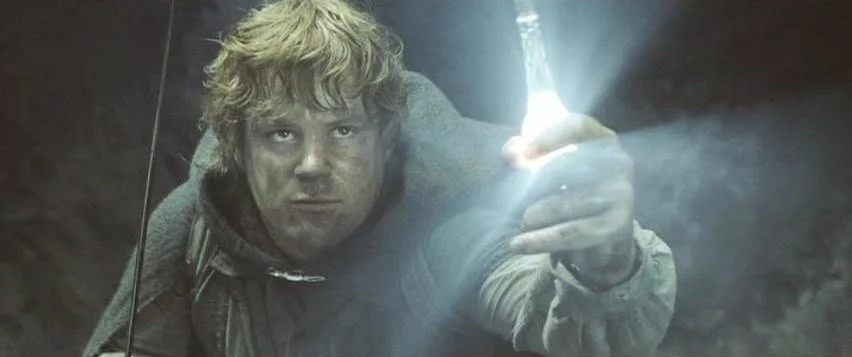Sean Astin on THE LORD OF THE RINGS Samwise Fandom, the Brilliance of Tolkien, and the Heroism of Hobbits
It’s been twenty years since The Lord of the Rings trilogy kicked off on screen, with director Peter Jackson releasing the three films consecutively in 2001, 2002, and 2003. A decade later, The Hobbit trilogy was released, and now you can own them all in 4k ultra HD, in one single package, The Ultimate Middle-Earth 6-Film Collector's Edition.
To celebrate the anniversary, Sean Astin, who played the story’s beloved Samwise Gamgee, sat down with ComicBook to talk at length about the books and their author J.R.R. Tolkien, the films, the fans, and more. When describing the love he receives for playing the part of Sam, he says:
"I would say 'fervent.' I would say 'all-consuming.' I would say 'intense.' These are the words that would describe the manner in which people need to communicate with me who they feel is the 'real hero' of the journey. I am always compelled to contextualize for them that there were at least nine nominal heroes of the Fellowship and then you've got lots of others who were integral to the story, the success of the journey to defeat Sauron. I think people have a natural tendency to root for the underdog. That's why the Hobbits are so compelling. Because who would expect these little creatures to carry the fate of the world on their shoulders?"
He goes on to sing the praises of Frodo, who he says some fans downplay the importance of, as Sam stepped in at times to mentally and physically carry his friend through his most difficult times.
"With Christ, there's a cross and nails that go through their hands and feet and the crown of thorns and blood coming down the head. With Frodo, it's the same type of journey. He's a Christ type figure and he sacrifices his immortal soul, maybe not completely, but you know something is lost, it can't be regained. So to me, anytime somebody says Sam is the true hero, the real hero, I kind of, on behalf of Sam, cringe a little bit even though I think Sam would kind of like it a little bit. I think he'd be like, even though I like it, okay, well at least they know I was in the movies too, that's nice."
Still, Astin understands Sam's appeal.
"We talk about true love, truth, honesty; these are concepts that we know in our lives based on their connection to things that aren't true and aren't real and are false," he says. "Our political figures say stuff and it just rings as false and hollow. And so there's something about when somebody truly loves you, you feel it, and Sam is true to Frodo and he's true to the mission and he's faithful and he's honorable and he's honest. He doesn't know how to lie and I think people feel protective of that, they feel protective of that emotion, they feel protective of that in themselves."
The report goes on to say that Astin acknowledges that Sam gets his due reward for his efforts and strength of character. He inherits The Red Book of the Westmarch, gets to marry the girl of his dreams, has lots of children, becomes mayor, and eventually reunites with Frodo in the Undying Lands.
"Sam gets his due, but people just love that earnest quality and frankly, I have that quality in me, as we all do to a greater or lesser extent, but the pump was primed for me growing up in a family of idealists. It's very complimentary when people want me to understand that, because they're basically paying me a compliment, and they're paying Tolkien and Sam. But it's flattering and I like it."
Astin was then asked to compare Tolkien’s version of heroism in ordinary characters with the version we see today in the superhero genre. Astin expressed his appreciation for superhero media and comic books, summing up their appeal, saying, "human beings want more for ourselves," adding:
"I think for Tolkien, he really thought about it, he really dissected it, he really understood the full contours of heroism, born in his own military service, as the parent of a service member who was fighting in the big war, the crucible of that kind of emotional experience. And he was a man of letters. He was a don, right? An Oxford don. And these guys read their asses off, and he was so deeply read. He was a philologist, and to and to say he understood languages, he understood language at its core, the sounds, the shape of language, the ideas.
Astin thinks it's easy to see where all of that study comes out in The Lord of the Rings, pretty much right from the start with the "Concerning Hobbits" section.
"It's the Shire, and they're pastoral people and they're sort of portly and there's this quaint feeling that kind of overlays the beginnings. And you can tell, even if you're it's your child and you're just listening to that, that something's coming, and this little tone that's being described is not going to last, and when it's recovered at the end, it won't be the same. I feel like he took a spiritual x-ray of heroism and depicted it."
Astin said he feels that's something Peter Jackson picked up on in his interpretation as well.
"I think Peter Jackson understood that. I think Peter is to cinema studies what Tolkien as to literary studies. Peter can pull apart movies. He's just a true fan, devotee, believer, student, master of cinema. And so you have this confluence of two guys who care about heroism."
It really was a perfect meeting of an incredible story, and a beautiful set of films to portray it. The Ultimate Middle-Earth 6-Film Collector's Edition is on sale now. Will you pick up a copy for yourself or a fan in your life?
